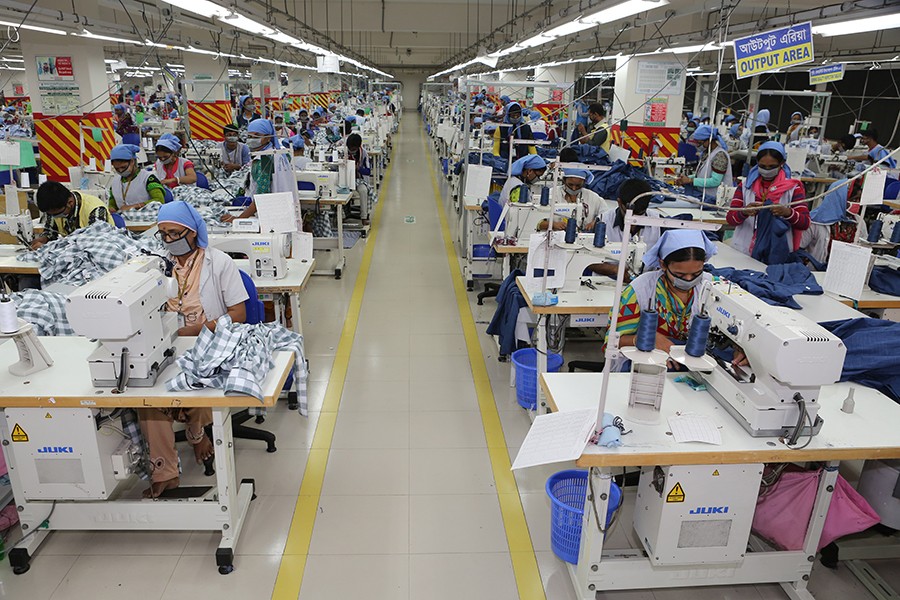Despite their overhead cost increased due to the recent wage hike, Bangladeshi readymade garment (RMG) manufacturers are facing continuous pressure from the global buyers to reduce the products prices further, according to a latest report.
"In Bangladesh for instance, 38 per cent of the suppliers reported that their buyers hold them to last year's prices, despite inflation and rising wages," said Better Buying Index Report 2019.
It also revealed that 36.4 per cent of the suppliers had to accept last-minute, low price orders to fill capacity while 31.8 per cent responded that they were left with unused capacity.
About 45 per cent left with excess materials. Of these, some 5.6 per cent reported retailers and brands paid for the excess materials and 83.3 per cent were asked to hold materials for use in future orders while 5.6 per cent reported retailers and brands took no responsibility for excess materials, the report revealed.
Better Buying, supported by C&A Foundation and Humanity United, on September 03 launched the report designed to support industry efforts to improve purchasing practices in supply chains globally.
The organisation tracked and released performance scores and analysed about purchasing practices, using data submitted anonymously by suppliers on its online platform.
It included 802 verified ratings from 715 suppliers across 52 countries, and measures the performance of 71 retailers and brands.
Buyer performance is measured against seven key categories of purchasing practices: planning and forecasting, design and development, cost and cost negotiations, sourcing and order placement, payment and terms, management of the purchasing process, and win-win sustainable partnership.
Most frequently reported high-pressure strategies by retailers/brands cost and cost negotiation practices in Bangladesh included sharing competitors' bids/pressure to meet other competitors across different countries, requiring supplier to meet specific elements of other suppliers' cost structure.
Take it or leave it - meet the target cost or supplier cannot win the order, also the strategies used by buyers, according to 27.9 per cent suppliers.
Some 25.6 per cent opined that buyers' strategy included demanding across the board price cuts from previous orders/years.
When asked, Bangladesh Garment Manufacturers and Exporters Association (BGMEA) president Dr Rubana Huq said the report revealed the truth with 38 per cent Bangladeshi suppliers responding year-on-year unchanged prices.
Better Buying's first-ever geographic analysis revealed different struggles faced by suppliers around the world.
The report showed that locations with the lowest production costs, such as South-East Asia and Bangladesh, experience the highest pressure from their customers to lower prices.
Moreover, the results demonstrate that the longer retailers/brands and suppliers are in a business relationship together, the more suppliers experience pressure on cost negotiations.
The report also said that Bangladesh is in better shape than many other locations when looking holistically at the findings. This is because the industry there has developed the capacity to satisfy the need for low-cost, high-volume production of core products, it said.
"They receive better practices related to monthly order stability yet face challenges when it comes to pricing," the report said, adding Hong Kong suppliers, on the other hand, face late forecasts, volatile monthly volumes, and pricing and calendar pressures, because for decades they have demonstrated the ability to provide any product for any customer at any time.
Furthermore, the findings show that countries with the lowest production costs, such as Bangladesh and South-East Asia (Cambodia, Malaysia, Philippines, Singapore, Thailand, Vietnam), experience maximum pressure on pricing and cost negotiation: they are challenged the most to further lower their cost of production.
On the other hand, geographical locations with reputations for concerning workplace conditions are incentivized for compliant production (63 per cent in BD) while locations such as US are hardly given any incentives for being compliant with buyer codes of conduct (19 per cent).
Marsha Dickson, Better Buying president and co-founder, in a statement said: these practices and their associated challenges are the result of decades of cooperative business relationships between buyers and their suppliers.
"Nevertheless, it needs to change toward more balanced relationships with all suppliers," Dickson said, adding Better Buying supports retailers/brands and their suppliers in making this transition, bringing insights from both parties into strategising for improvements.
"By providing expanded transparency between supply chain partners and facilitating dynamic, solutions-oriented feedback, we change processes that deliver meaningful social, environmental, and business impacts," he added.


